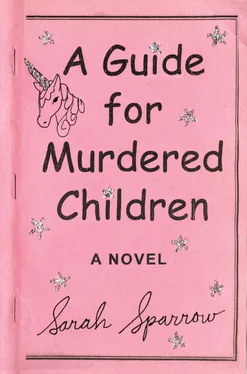Sarah Sparrow - A Guide for Murdered Children
Здесь есть возможность читать онлайн «Sarah Sparrow - A Guide for Murdered Children» весь текст электронной книги совершенно бесплатно (целиком полную версию без сокращений). В некоторых случаях можно слушать аудио, скачать через торрент в формате fb2 и присутствует краткое содержание. Город: New York, Год выпуска: 2018, ISBN: 2018, Издательство: Blue Rider Press, Жанр: Фэнтези, Триллер, Детектив, на английском языке. Описание произведения, (предисловие) а так же отзывы посетителей доступны на портале библиотеки ЛибКат.
- Название:A Guide for Murdered Children
- Автор:
- Издательство:Blue Rider Press
- Жанр:
- Год:2018
- Город:New York
- ISBN:978-0-399-57452-8
- Рейтинг книги:5 / 5. Голосов: 1
-
Избранное:Добавить в избранное
- Отзывы:
-
Ваша оценка:
- 100
- 1
- 2
- 3
- 4
- 5
A Guide for Murdered Children: краткое содержание, описание и аннотация
Предлагаем к чтению аннотацию, описание, краткое содержание или предисловие (зависит от того, что написал сам автор книги «A Guide for Murdered Children»). Если вы не нашли необходимую информацию о книге — напишите в комментариях, мы постараемся отыскать её.
A Guide for Murdered Children — читать онлайн бесплатно полную книгу (весь текст) целиком
Ниже представлен текст книги, разбитый по страницам. Система сохранения места последней прочитанной страницы, позволяет с удобством читать онлайн бесплатно книгу «A Guide for Murdered Children», без необходимости каждый раз заново искать на чём Вы остановились. Поставьте закладку, и сможете в любой момент перейти на страницу, на которой закончили чтение.
Интервал:
Закладка:
When he got older, the dreams and visions stopped. They didn’t go away, not exactly, but he stifled them, believing them to be useless and borderline destructive. In his late forties, around the time Willow left homicide and began working Cold Case in New York, the visions returned. He stuffed them again. He grew tortured, wondering if their suppression was an act of selfishness and cowardice, of weakness. In the middle of these musings, a chill came over him. The chill was accompanied by a dreamlike whoosh , now familiar—
—with a shock, Willow realized he’d been standing there lost in thought and that Larkin was gone from his swing. When his panicked eyes found the boy, he ran over to him dramatically enough that it seized the attention of the other parents and guardians. Sitting in the red caboose of the kiddie train, startled by his grandfather’s near-violent, beneath-the-armpit extraction from the car, Larkin burst into tears. Willow carried him to a park bench and sat the toddler on his lap as he tried to soothe. The boy’s tears and squirmings were quickly blotted out by the sight of the small train, soldered to its decorative track for safety. Willow stared at it, shivering with recognition—but recognition of what? Where had he seen it? He remembered now, though the feeling was in fragments. Still, he wasn’t certain if it was a throwback to one of his old-time visions, or something new.
He was suddenly possessed by the irrational thought that no child deserves to be on a train, any train! But he couldn’t explain his sensations; nor could he trace the feelings behind why a little boy’s benign and playful presence in a miniature locomotive was a mournful and disastrous thing.
LYDIA TAKES A MEETING
1.
When a cop killed someone—a fairly unusual occurrence here—department policy mandated a visit to the shrink. If a deputy was shot, he had to do therapy too. (America’s newest religion was the cult of Trauma.) Daniel Doheny already had his session.
Lydia hadn’t given a second thought to the “death of the bachelor” (for a few weeks, whenever her substation colleagues saw her they broke into the Panic! at the Disco song the madman was crooning at Tim Hortons), at least not in the conventional sense. If anything, the incident stirred up questions she would never have brought up with the police shrink. No, they were issues more along the line of things she’d talk over with Annie, the woman who led the Meeting and called herself “the Porter.”
Lydia wrote them down on a pad so she wouldn’t forget.
Questions! There were so many that even the idea of them was absurd. She was definitely still Lydia—but how much of Lydia? And just how long would the “landlord” Lydia dominate, in brain and in body? She certainly felt like Deputy Molloy; all of those woman’s memories were intact and accountable. She even remembered that ill-fated hike… drifting in recollection, she knew she was wholly Lydia, more or less, in the moment. She liked the food and clothes and smells that Lydia liked, and the music too—classical (Copland and Kindertotenlieder ), hip-hop (Nicki and Kanye and Big Sean) and Top 20 (Adele and Rihanna). Plus, there were certain men and women whom she worked with (except for Daniel) or passed along the street who made her feel what she called sexybody . But what of the other memories and feelings, those of her tenant-“roommate”? What about being able to recall a set of parents different from her own? What about holding the stuffed unicorn close to her so she could sleep? (Lydia had never been a fan of stuffed animals.) What about her craving for cotton candy — she was a vegan who was nearly phobic about sugar — or when she made plans to buy turtles and goldfishes. What about when she zoned out in front of the TV in front of Rugrats and Dora the Explorer ?
Lydia favored shows like Dr. Who and Black Mirror …
Friends still called her cell and she had no trouble talking to them, no trouble at all—a bunch whom she hadn’t heard from came out of the woodwork right after the shooting—but once Lydia hung up she drifted again, feeling ten thousand miles away. Her mom and dad, proud and worried about the whole Tim Hortons thing, came in from Minnesota to stay with her and she was fine with them too; she loved them in the same way she loved the other parents, Maya’s parents, though Maya’s were so pale, so hard to summon. Lydia was aware that she seemed “different,” especially to her folks; she would have had to because she wasn’t their Lydia anymore, not completely. They never made any remarks about it (though sometimes seemed on the verge), but she also knew that whatever part of her that appeared anomalous or strangely new—being spacey or whatever—would be written off by them to the post-traumatic stress of the Tom Ford lookalike kill. After a Meeting, Annie told Lydia that she was actually fortunate to have had that incident because it was a good “cover” for odd and unfamiliar behaviors.
At the time of her death, Lydia had two half-casual lovers, a man and a woman, sweet sexybody buddies from different counties, neither of whom knew about each other. But she ended all that because, well, Maya wasn’t exactly thrilled. (One of them even showed up when Daniel was there. Awkward. ) They managed their hurt feelings by attributing Lydia’s cooling passions to her shooting that crazy man; the Porter had absolutely predicted how they’d rationalize her pulling away. Out of weakness, she let the man play with her body for a few weeks and it did feel good, but Maya was weirded out so Lydia chose to stop — she was overruled. That’s why it felt so nice to be with Daniel, because he understood. They started talking about secret things, not in detail but enough for Lydia to know that he felt the same way she did. He never talked about his lovers and she wondered if he was in the closet. Not that it would have mattered. She just felt lucky to have found him. It was like a miracle.
There were so many things to ask Annie, though most of her questions and concerns would soon fall away, the way they always did in a landlord’s journey. They would migrate and become the concerns of another, someone already on their way to the station to greet the train.
2.
The first time Lydia went to the Meeting, she was almost late.
How had she even gotten there?
She dreamed she was back on the train. The Porter came to her cabin with the usual tray of cookies and lemonade and everything was so clear, unlike the fuzziness she was accustomed to when trying to conjure the same tableau during waking hours. There was a little boy there too but he was fuzzy, even in the dream. The Porter—Annie—told her they would be arriving soon and it was of great importance that she come to see her. She wrote the address down on the back of the coaster the lemonade was on and told the little girl she should commit it to memory. Maya said that she was terrible at remembering things, but Annie assured her that she wouldn’t forget.
“When should I come?” asked Maya.
“You’ll know,” said Annie, then smiled and left.
Maya turned over the coaster.
The Divine Child Parish
276 Lafayette Circle, Detroit, MI 48206
Be there or be square!
She was supposed to have pizza with Daniel that night but told him she had to meet a friend. He raised an eyebrow, implying she was having a rendezvous with one of her old sexybodies , but was funny and permissive about it. At the last moment, Lydia said, “You didn’t have the dream?”
“What dream?” he answered, and she felt foolish.
Читать дальшеИнтервал:
Закладка:
Похожие книги на «A Guide for Murdered Children»
Представляем Вашему вниманию похожие книги на «A Guide for Murdered Children» списком для выбора. Мы отобрали схожую по названию и смыслу литературу в надежде предоставить читателям больше вариантов отыскать новые, интересные, ещё непрочитанные произведения.
Обсуждение, отзывы о книге «A Guide for Murdered Children» и просто собственные мнения читателей. Оставьте ваши комментарии, напишите, что Вы думаете о произведении, его смысле или главных героях. Укажите что конкретно понравилось, а что нет, и почему Вы так считаете.












